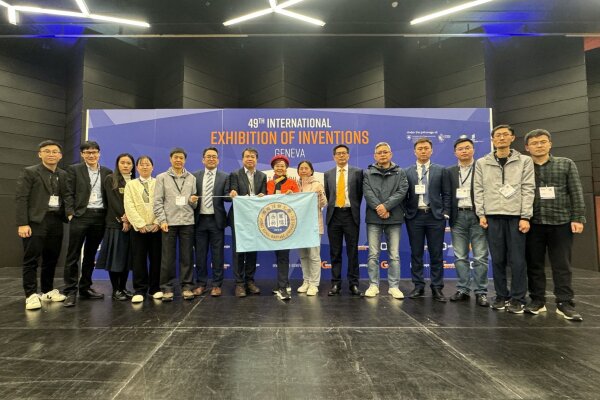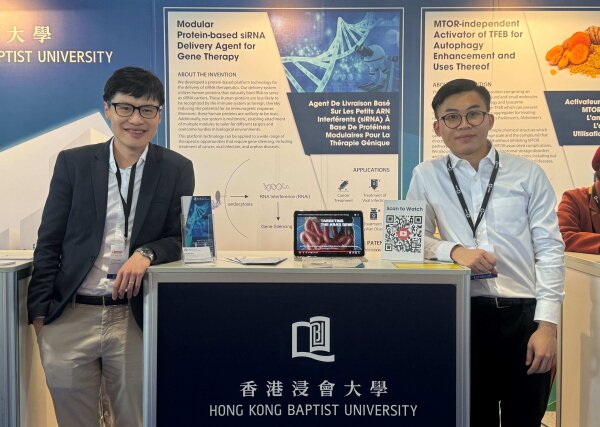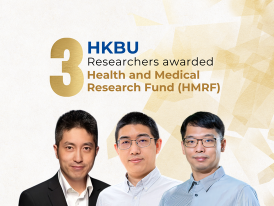
Innovations of HKBU scholars celebrated at Geneva International Exhibition of Inventions
The innovative research projects of Hong Kong Baptist University (HKBU) scholars took the spotlight at the 49th Geneva International Exhibition of Inventions held from 17 to 21 April, capturing a total of nine awards including one Gold Medal with Congratulations of the Jury, four Silver Medals and four Bronze Medals.
The award winning HKBU research projects are:
Gold Medal with Congratulations of the Jury
- “Modular protein-based siRNA delivery agent for gene therapy” by Dr Aik Weishen, Assistant Professor of the Department of Chemistry
This is a cutting-edge protein-based platform technology for the delivery of small-molecule of RNA interference (siRNA) therapeutics. The delivery system utilises proteins found naturally in the human body that can bind to ribonucleic acid (RNA) and serve as carriers for siRNA. These proteins are less likely to be identified as foreign substances by the immune system, thereby reducing the risk of immune reactions. Furthermore, it can be customised to adapt to different targets and overcome biological barriers, showcasing immense potential for gene silencing therapies in a range of medical situations, such as cancer, viral infections, and rare diseases.
Silver Medal
- “Quality control marker for use in authentication of edible bird’s nest” by Professor Simon Han Quanbin, Professor of the Teaching and Research Division of the School of Chinese Medicine
Professor Han has developed a series of peptide markers in the hydrolysates of the edible bird’s nest (EBN). This method not only enables qualitative and quantitative authentication of EBN and its related products, but also provides a unique capability to differentiate between white EBN, which is more commonly used, and the less expensive grass EBN materials. This breakthrough significantly contributes to the overall authentication process, ensuring the genuineness of EBN in the market.
- “MTOR-independent activator of TFEB for autophagy enhancement and uses thereof” by Professor Li Min, Executive Associate Dean of Chinese Medicine and Ma Pak Leung Endowed Professor in Innovative Neuromedicine
The research team discovered a composition comprising an autophagy enhancement compound and small molecules. By activating a specific gene called TFEB, this composition promotes autophagy and the creation of lysosomes that helps prevent the accumulation of toxic protein aggregates associated with neurodegenerative diseases such as Parkinson’s, Alzheimer’s and Huntington’s diseases. The compound has a simple chemical structure which directly binds to and activates TFEB without inhibiting the MTOR signalling pathway, which reduces the potential complications associated with MTOR inhibition.
- “Novel mechanisms of affordable, safe, and edible medicinal herb BH1 in preventing colorectal cancer” by Dr Sze Cho-wing, Associate Director and Assistant Professor of the Golden Meditech Centre for NeuroRegeneration Sciences
The research discovered a botanical composition BH1 which is able to prevent colorectal cancer, the third most common cancer worldwide. Dr Sze and his team are currently focusing on improving BH1 to create supplements and food additives that can be added to everyday food items like cereals, biscuits, and energy drinks. The goal is to incorporate BH1 into these products without altering their original taste.
- “Gas-efficient blockchain technology for trustworthy data storage and retrieval” by Professor Xu Jianliang, Head and Chair Professor of the Department of Computer Science
This innovative and economically effective solution provides a cost-effective way to manage blockchain data by improving gas efficiency and ensuring the integrity of queries within a blockchain network. The expenses associated with processing blockchain transactions can be reduced by up to 78%. Furthermore, it guarantees that the data obtained through queries remains accurate and unaltered from where it was originally stored. If any information is missing or corrupted, the system can quickly identify and alert users.
Bronze Medal
- “New nanofiber coating technology as a versatile platform for enhancing performance and sustainability of various products” by Dr Ken Leung Cham-fai, Associate Professor of the Department of Chemistry
This new ultrasound-assisted nanofiber coating technology enhances thermal stability, resists corrosion and prevents scratches. It can be applied to create stronger and more durable materials and products. Examples of such products include but are not limited to paints, color pigments, reinforced concrete and parts for electronic appliances. These coatings can be applied to various surfaces like concrete, metal, glass, wood, plastic, and leather, improving their ability to withstand high temperatures.
- “Diagnostic kits and prebiotics products for irritable bowel syndrome and metabolic syndrome” by Dr Zhai Lixiang, Assistant Professor of the Centre for Chinese Herbal Medicine Drug Development
The gut microbiota-based diagnostic kits for diagnosis of irritable bowel syndrome (IBS) and metabolic syndrome can help to identify potential risks of metabolic diseases including insulin resistance and type 2 diabetes. Dr Zhai and his team have developed prebiotics formulated with Chinese medicine to support the growth of beneficial gut bacteria and regulate imbalances in the gut. This is particularly beneficial for individuals with IBS and metabolic syndrome, as these conditions often involve disruptions in the gut microbiota.
- “Health products for anti-fibrosis” by Professor Zhang Hongjie, Associate Dean (Teaching and Learning) of Chinese Medicine and Director of the Teaching and Research Division of the School of Chinese Medicine
The research team has studied compounds called dihydro-resveratrol (DR2)-type stilbenoids as anti-fibrotic agents. These compounds show prospects in managing health conditions related to fibrosis, such as pulmonary fibrosis, liver cirrhosis, and skin aging. DR2-type stilbenoids have the potential to alleviate lung injury caused by acute pancreatitis. The compounds also demonstrated the ability to protect the structure of the lungs in such cases. Additionally, DR2-type stilbenoids have a promising role in addressing organ damage caused by activated stellate cells, which is crucial in the initiation of fibrosis upon activation.
- “Tongue HealthChecker - method, device and computer system for tongue imaging” by Dr Zhang Shiping, Associate Professor of the Teaching and Research Division of the School of Chinese Medicine
The mobile app allows users to capture images of their tongue coating and send them to a server for analysis and remote evaluation of their tongue condition, from a Chinese medicine perspective. This app serves as a valuable self-monitoring tool, empowering users to potentially prevent or detect illnesses at an early stage. The team’s objective is to integrate traditional Chinese medicine diagnostic methods with modern technology, providing individuals with the ability to monitor their own health status conveniently.
Aspiring to be a leading research-led university in Asia for the world, HKBU engages in cutting-edge, innovative and transdisciplinary research endeavours that push the boundaries of knowledge, address global issues, and contribute to the well-being of both local and international communities. HKBU’s award winning projects at this year’s Geneva International Exhibition of Inventions exemplify the university’s unwavering dedication in translating research outcomes into practical applications for the benefit of mankind.
The Geneva International Exhibition of Inventions is a signature annual global event devoted exclusively to inventions. This year, a total of 1,035 inventions from 38 countries and regions were evaluated by a panel of professional judges.




